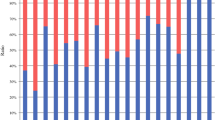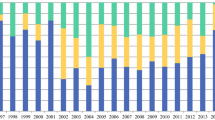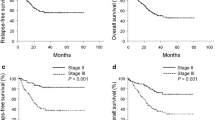Abstract
Background
Controversy surrounds adjuvant chemotherapy (CTx) for T3N0M0 and T1N2M0 in the American Joint Committee on Cancer (AJCC) 7th edition stage IIA gastric cancer patients. The purpose of this study was to evaluate the benefit of adjuvant CTx for stage IIA cancer, including T3N0M0 and T1N2M0.
Methods
A total of 630 patients with stage IIA cancer who underwent a radical gastrectomy between January 1999 and December 2009 at Seoul National University Hospital were retrospectively analyzed. We compared the outcomes of 434 patients who did not receive CTx (the non-CTx group) with those of 196 patients who received CTx comprising of 5-fluorouracil-based regimens (the CTx group).
Results
The 5-year overall survival (OS) rates of the non-CTx and CTx groups were 86.4 and 89.3 %, respectively (p = 0.047). In the subgroup analysis of T2N1M0 (6th II/7th IIA), there was a significant difference in OS between the non-CTx and CTx groups (p = 0.003), but no differences were observed in T3N0M0 and T1N2M0 (6th IB/7th IIA) (p = 0.574 and p = 0.934). The multivariate analysis showed that a tumor size greater than 5 cm in T3N0M0 [odds ratio (OR) 1.929; p = 0.030], no adjuvant CTx in T2N1M0 (OR 4.853; p = 0.025), and no factors in T1N2M0 were found to be risk factors for recurrence-free survival.
Conclusions
Adjuvant CTx may be associated with an improved outcome of patients with T2N1M0 (6th II/7th IIA), but not T3N0M0 or T1N2M0 (6th IB/7th IIA), gastric cancer. To confirm these results, further studies are needed.


Similar content being viewed by others
References
Ferlay J, Shin HR, Bray F, Forman D, Mathers C, Parkin DM. Estimates of worldwide burden of cancer in 2008: GLOBOCAN 2008. Int J Cancer. 2010;127(12):2893–917.
Jung KW, Won YJ, Kong HJ, Oh CM, Lee DH, Lee JS. Cancer statistics in Korea: incidence, mortality, survival, and prevalence in 2011. Cancer Res Treat. 2014;46(2):109–23.
Ahn HS, Lee HJ, Yoo MW, Jeong SH, Park DJ, Yang HK. Changes in clinicopathological features and survival after gastrectomy for gastric cancer over a 20-year period. Br J Surg. 2011;98(2):255–60.
Macdonald JS, Smalley SR, Benedetti J, et al. Chemoradiotherapy after surgery compared with surgery alone for adenocarcinoma of the stomach or gastroesophageal junction. N Engl J Med. 2001;345(10):725–30.
Cunningham D, Allum WH, Stenning SP, et al. Perioperative chemotherapy versus surgery alone for resectable gastroesophageal cancer. N Engl J Med. 2006;355(1):11–20.
Ychou M, Boige V, Pignon JP, et al. Perioperative chemotherapy compared with surgery alone for resectable gastroesophageal adenocarcinoma: an FNCLCC and FFCD multicenter phase III trial. J Clin Oncol. 2011;29(13):1715–21.
Sakuramoto S, Sasako M, Yamaguchi T, et al. Adjuvant chemotherapy for gastric cancer with S-1, an oral fluoropyrimidine. N Engl J Med. 2007;357(18):1810–20.
Sasako M, Sakuramoto S, Katai H, et al. Five-year outcomes of a randomized phase III trial comparing adjuvant chemotherapy with S-1 versus surgery alone in stage II or III gastric cancer. J Clin Oncol. 2011;29(33):4387–93.
Bang YJ, Kim YW, Noh SH, et al. Adjuvant capecitabine and oxaliplatin for gastric cancer after D2 gastrectomy (CLASSIC): a phase 3 open-label, randomised controlled trial. Lancet. 2012;379(9813):315–21.
Noh SH, Park SR, Bang YJ, et al. Adjuvant capecitabine plus oxaliplatin for gastric cancer after D2 gastrectomy (CLASSIC): 5-year follow-up of an open-label, randomised phase 3 trial. Lancet Oncol. 2014;15(12):1389–96.
Ajani JA, Bentrem DJ, Besh S, et al. National Comprehensive Cancer Network. Gastric cancer, version 2.2013: featured updates to the NCCN Guidelines. J Natl Compr Canc Netw. 2013;11(5):531–46.
Waddell T, Verheij M, Allum W, Cunningham D, Cervantes A, Arnold D. European Society for Medical Oncology (ESMO); European Society of Surgical Oncology (ESSO); European Society of Radiotherapy and Oncology (ESTRO). Gastric cancer: ESMO-ESSO-ESTRO clinical practice guidelines for diagnosis, treatment and follow-up. Ann Oncol. 2013;24 Suppl 6:vi57–63.
Japanese Gastric Cancer Association. Japanese gastric cancer treatment guidelines 2010 (ver. 3). Gastric Cancer. 2011;14(2):113–23.
Lee JH, Kim JG, Jung HK, et al. Synopsis on clinical practice guideline of gastric cancer in Korea: an evidence-based approach. Korean J Gastroenterol. 2014;63(2):66–81.
Sobin LH, Wittekind CH, eds. TNM classification of malignant tumors. 6th ed. New York: Wiley; 2002.
Greene FL, Page DL, Fleming ID, et al. (eds). AJCC cancer staging manual: TNM classification of malignant tumors. 6th ed. New York: Springer; 2002.
Edge SB, Byrd DR, Compton CC, et al. (eds). AJCC cancer staging handbook. 7th ed. New York: Springer; 2010.
Ahn HS, Lee HJ, Yang HK, et al. Evaluation of the seventh American Joint Committee on Cancer/International Union Against Cancer Classification of gastric adenocarcinoma in comparison with the sixth classification. Cancer. 2010;116(24):5592–8.
Songun I, Putter H, van de Velde CJ. Surgical treatment of gastric cancer: 15-year follow-up results of the randomised nationwide Dutch D1D2 trial. Lancet Oncol. 2010;11(5):439–49.
Wu CW, Hsiung CA, Li AF, et al. Nodal dissection for patients with gastric cancer: a randomised controlled trial. Lancet Oncol. 2006;7(4):309–15.
Degiuli M, Sasako M, Ponti A; Italian Gastric Cancer Study Group. Morbidity and mortality in the Italian Gastric Cancer Study Group randomized clinical trial of D1 versus D2 resection for gastric cancer. Br J Surg. 2010;97(5):643–9.
Kim NK, Park YS, Heo DS, et al. A phase III randomized study of 5-fluorouracil and cisplatin versus 5-fluorouracil, doxorubicin, and mitomycin C versus 5-fluorouracil alone in the treatment of advanced gastric cancer. Cancer. 1993;71(12):3813–8.
Chang HM, Jung KH, Kim NK, et al. A phase III randomized trial of 5-fluorouracil, doxorubicin, and mitomycin C versus 5-fluorouracil and mitomycin C versus 5-fluorouracil alone in curatively resected gastric cancer. Ann Oncol. 2002;13(11):1779–85.
GASTRIC (Global Advanced/Adjuvant Stomach Tumor Research International Collaboration) Group, Paoletti X, Oba K, Burzykowski T, Michiels S, Ohashi Y, Pignon JP, et al. Benefit of adjuvant chemotherapy for resectable gastric cancer: a meta-analysis. JAMA. 2010;303(17):1729–37.
Nakajima T, Nashimoto A, Kitamura M, et al. Adjuvant mitomycin and fluorouracil followed by oral uracil plus tegafur in serosa-negative gastric cancer: a randomised trial. Lancet. 1999;354(9175):273–7.
Nashimoto A, Nakajima T, Furukawa H, et al. Randomized trial of adjuvant chemotherapy with mitomycin, fluorouracil, and cytosine arabinoside followed by oral fluorouracil in serosa-negative gastric cancer: Japan Clinical Oncology Group 9206-1. J Clin Oncol. 2003;21(12):2282–7.
Warneke VS, Behrens HM, Hartmann JT, Held H, Becker T, Schwarz NT, et al. Cohort study based on the seventh edition of the TNM classification for gastric cancer: proposal of a new staging system. J Clin Oncol. 2011;29(17):2364–71.
Baiocchi GL, Tiberio GA, Minicozzi AM, et al. A multicentric Western analysis of prognostic factors in advanced, node-negative gastric cancer patients. Ann Surg. 2010;252(1):70–3.
Saito H, Kuroda H, Matsunaga T, et al. Prognostic indicators in node-negative advanced gastric cancer patients. J Surg Oncol. 2010;101(7):622–5.
Lee IS, Yook JH, Kim TH, et al. Prognostic factors and recurrence pattern in node-negative advanced gastric cancer. Eur J Surg Oncol. 2013;39(2):136–40.
Huang CM, Wang HM, Zheng CH, et al. Tumor size as a prognostic factor in patients with node-negative gastric cancer invading the muscularis propria and subserosa (pT2-3N0M0 stage). Hepatogastroenterology. 2013;60(124):699–703.
Kooby DA, Suriawinata A, Klimstra DS, Brennan MF, Karpeh MS. Biologic predictors of survival in node-negative gastric cancer. Ann Surg. 2003;237(6):828–35.
Soga K, Ichikawa D, Yasukawa S, Kubota T, Kikuchi S, Otsuji E. Prognostic impact of the width of subserosal invasion in gastric cancer invading the subserosal layer. Surgery. 2010;147(2):197–203.
Gunji Y, Suzuki T, Hori S, Hayashi H, Matsubara H, Ochiai T. Prognostic significance of the number of metastatic lymph nodes in early gastric cancer. Dig Surg. 2003;20(2):148–53.
Huang B, Zheng X, Wang Z, Wang M, Dong Y, Xu H. Prognostic significance of the number of metastatic lymph nodes: is UICC/TNM node classification perfectly suitable for early gastric cancer? Ann Surg Oncol. 2009;16(1):61–7.
Shimada S, Yagi Y, Honmyo U, Shiomori K, Yoshida N, Ogawa M. Involvement of three or more lymph nodes predicts poor prognosis in submucosal gastric carcinoma. Gastric Cancer. 2001;4(2):54–9.
Lee HJ, Kim YH, Kim WH, Lee KU, Choe KJ, Yang HK. Clinicopathological analysis for recurrence of early gastric cancer. Jpn J Clin Oncol. 2003;33(5):209–14.
Saka M, Katai H, Fukagawa T, Nijjar R, Sano T. Recurrence in early gastric cancer with lymph node metastasis. Gastric Cancer. 2008;11(4):214–8.
Suh YS, Han DS, Yang HK, et al. Should adenocarcinoma of the esophagogastric junction be classified as esophageal cancer? A comparative analysis according to the seventh AJCC TNM classification. Ann Surg. 2012;255(5):908–15.
Acknowledgment
This study was supported by a Grant from the Doosan Yonkang Foundation (30-2011-0080) and a grant from the Seoul National University College of Medicine Research Fund (800-20130197).
Conflict of interest
Kyung-Goo Lee, Hyuk-Joon Lee, Seung-Young Oh, Jun-Young Yang, Hye-Seong Ahn, Yun-Suhk Suh, Seong-Ho Kong, Tae-Yong Kim, Do-Youn Oh, Seock-Ah Im, Kuhn Uk Lee, Woo Ho Kim, Yung-Jue Bang, and Han-Kwang Yang declare no conflicts of interest.
Author information
Authors and Affiliations
Corresponding author
Electronic supplementary material
Below is the link to the electronic supplementary material.
Rights and permissions
About this article
Cite this article
Lee, KG., Lee, HJ., Oh, SY. et al. Is There Any Role of Adjuvant Chemotherapy for T3N0M0 or T1N2M0 Gastric Cancer Patients in Stage II in the 7th TNM but Stage I in the 6th TNM System?. Ann Surg Oncol 23, 1234–1243 (2016). https://doi.org/10.1245/s10434-015-4980-7
Received:
Published:
Issue Date:
DOI: https://doi.org/10.1245/s10434-015-4980-7




